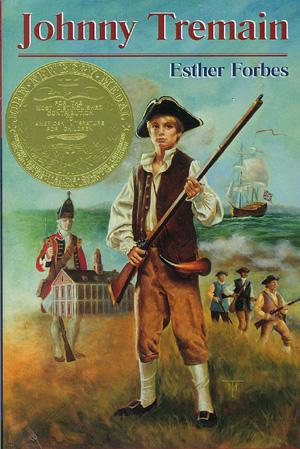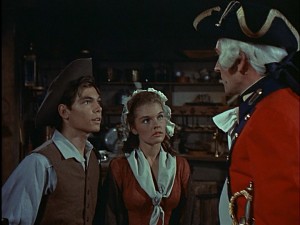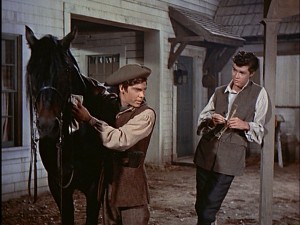Johnny Tremain Themes
Introduction
Johnny Tremain by Esther Forbes is a story about the American Revolution and the principles of freedom and democracy it established throughout the world. Other important aspects of Johnny Tremain are resistance to tyranny, individual rights, the political setting, and the social setting.
The American flag, a symbol
of freedom and democracy
Freedom, Democracy, Resistance to Tyranny, and Individual Rights
Johnny Tremain is about more than just Americans fighting the British in the American Revolution. It is about freedom and democracy, resistance to all kinds of tyranny and oppression everywhere, and most of all an individual's natural rights to stand up. Esther Forbes uses the American Revolution to illustrate and portray these principles to her reader. The theme of Johnny Tremain can be best summarized and described by a single statement that appears throughout the book - "so that a man can stand up".The American Revolution established many of the principles of freedom in the world today and laid them out in the constitution. It established that every individual has natural rights given to them and so all are equal and thus should be treated equally. Even though today many of these principles seem commonplace, back then these ideas seemed revolutionary and the constitution was considered a milestone.
"And the strange new sun rising in the west. A sun that was to illumine a world to come." This is a striking statement made by Esther Forbes. She is referring to the very first revolution of its kind rising up from America. The revolution that would establish new principles of freedom, show the world the rights of individuals, and trigger the wave of revolutions around the world that would lead to the new democratic nations.
The Political Setting of Johnny Tremain
The political setting during Johnny Tremain has a heavy impact on the story. Set in the time of the American Revolution, there was a great deal of conflict between the American colonies and England. The most contentious issue was that the colonists were being taxed by England on goods, yet the colonists had no representation in the English Parliament. Many colonists saw this as a violation of their rights and opposed England. Freedom groups such as the Sons of Liberty organized rallies and demonstrations against such taxes. "No taxation without representation!" became their popular cry.It was not long before an American resistance had been organized against the English. The colonists who supported this resistance were known as Whigs after the Whig Party in English Parliament. The Whig Party was one of two parties in Parliament, the other being the Tory Party. The Whig Party supported giving the colonies their representation and freedom, while the Tory Party was against this.
In 1770, Parliament, bowing to the protest, withdrew all taxes on goods except for tea which still retained a small tax in order to demonstrate the power of Parliament to tax the colonies. Even then, however, the colonists still refused to buy the English tea and as a form of protest in 1773, a group of Boston citizens, many disguised as Native Americans, swarmed over English ships in Boston Harbor and dumped the cargoes of tea into the sea. This became known as the Boston Tea Party, a key event in American history as it helped to trigger off the American Revolution.
The Boston Tea Party provoked great anger amongst the English and on April 19, 1775, the first armed encounter between England and the colonists took place at Lexington. This battle was the start of the American War of Independence. Thanks to Paul Revere, who had rode from Charlestown to Lexington the night before to warn of the coming English troops, the colonists were prepared for the attack.
Revere then started for Concord but was captured on the way; however, another messenger riding with him did arrive and aroused the town for war. Paul Revere's ride was of great importance to the colonists as it prepared them for the Revolution against England. The Revolution was fought until September 3, 1783 when the colonies defeated the British and by doing so earned their freedom and independence.
The Social Setting of Johnny Tremain
The society in Johnny Tremain had many differences to ours today. The most obvious differences throughout the book Johnny Tremain are the Christian religious aspect of the people's lives, and the people's working situation.Although most people in Johnny Tremain were Christian in religion and observed many Christian practices such as reading the Bible and not working on Sundays, they did not seem to have a very Christian nature at heart. The church was very strict about keeping Biblical rules yet people seemed to practice only some of the principles of the Bible. For example, it was against the law to work on Sunday, yet the principles of loving your neighbor and caring for the poor mattered so little that many people could starve from not being able to buy food.
The other major difference was the way that people worked and the employment situation. Back then most of the work people did was very physical, such as silverworking and metalworking, whereas today machines do most of the physical work for us and people do more mentally based work. As a result, many people weren't educated and most couldn't even read.
When people were employed or taken on as an apprentice they would go and live with their master for a certain period of time. Apprentices received no wages for working just food, accommodation, and clothing. They were basically forced to live with their master because if they ran away they could die of starvation if not employed soon after. Consequently, the master's family would become like the apprentice's own family and the apprentice or employee would often be arranged to marry one of the master's daughters to keep the business in the family, just as Johnny was arranged to marry Cilla.
By Ben Wagner
First published: June 1, 2006, Last updated: May 4, 2024
Related Articles

Johnny Tremain Summary

Johnny Tremain Characters

Johnny Tremain Quotes


